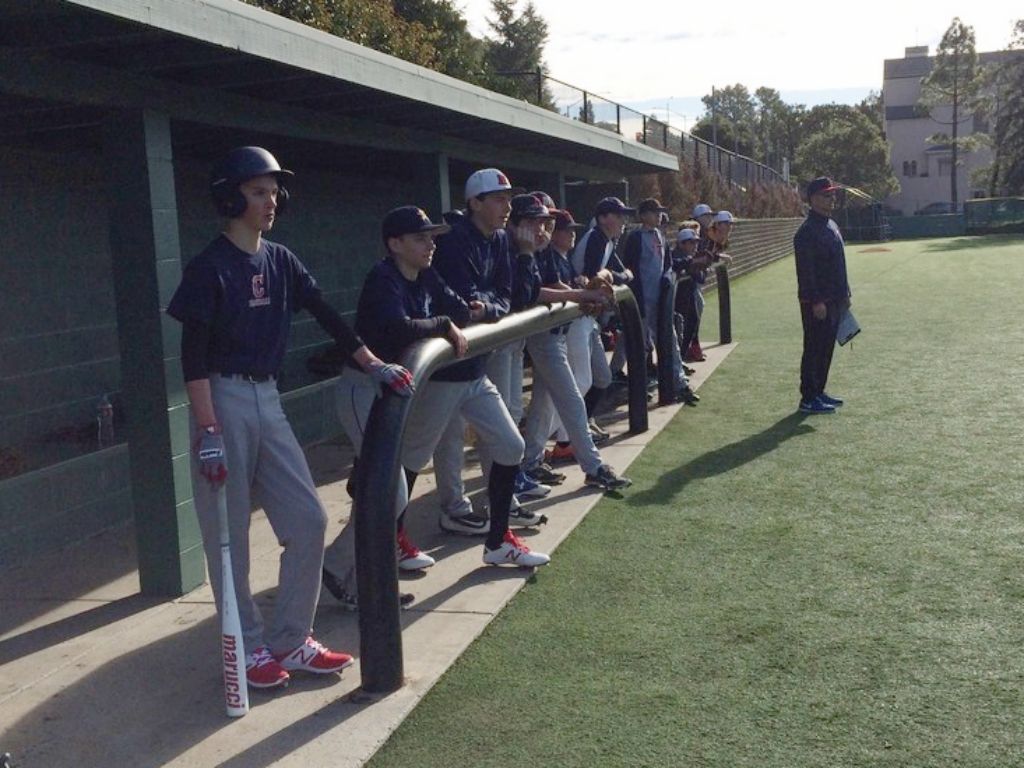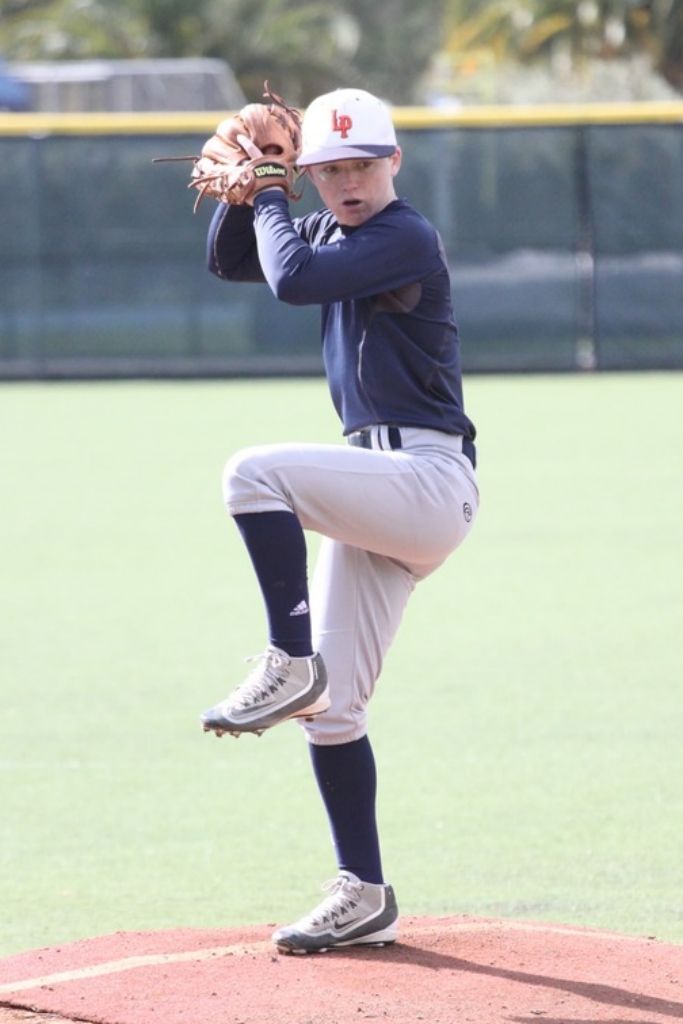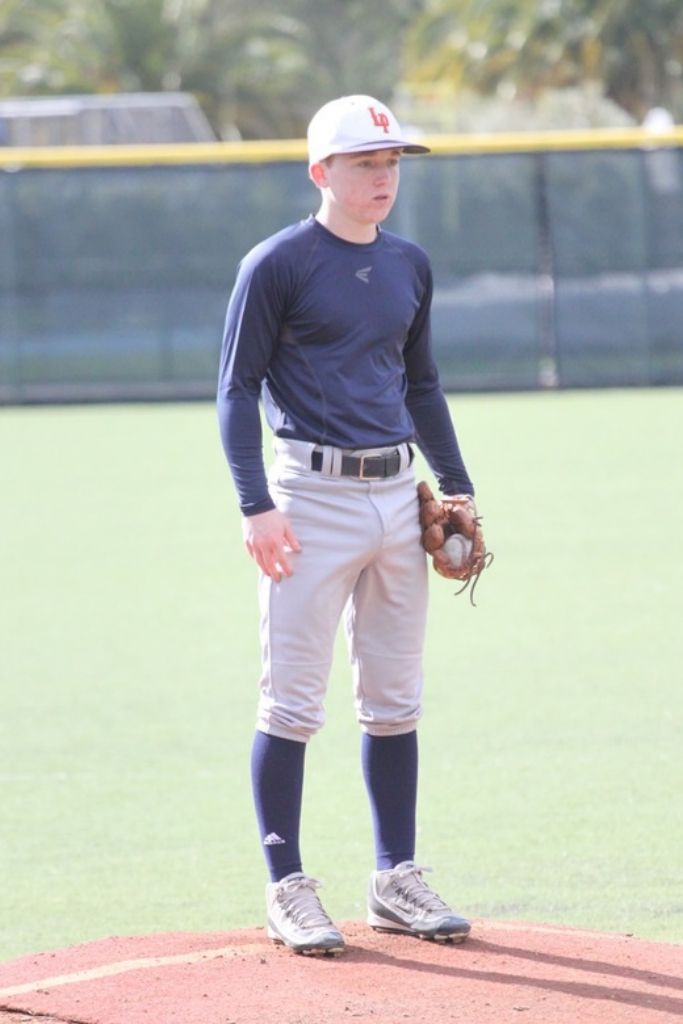The last baseball post here before the hiatus announced
Michael’s arrival at the top level of the local youth baseball scene.
His story since then deserves to be
told.
Each season in those four amazing years
of youth baseball will get its own report, as each season had a unique
character, with new triumphs, failures and lessons along the way.
First up: the 11U Mavericks.
 |
| First time in the uniform, feeling as young as he looked |
|
|
|
Just making this team was a magnificent accomplishment.
It took some time, however, to shake the
feeling that Michael was the 12
th man on a 12-person squad.
The other eleven boys had played together as
an all-star team for the previous summer, and most of them had been on an all-star
team together the summer before that.
It
didn’t help that the roster spot Michael took had been vacated by the best
player on the team, so there was the perception that the team was instantly
weaker than it had been.
Michael was
determined and took coaching as well as anyone, but he was still small and had
not begun to develop a maturing strength like some of the other boys.
A couple of practice games against our archrivals before the
season began showed that while Michael proved he could keep up most of the
time, he still had a long way to go in understanding his role, especially when
the ball was in play somewhere else on the field. I sensed that he was a little intimidated by
his teammates and was more deferential and not as aggressive as he might have
been with different people around him.
Knowing that the level of competition was going to be higher than he had
ever faced before, we were all a wee bit apprehensive going into the season.
The season opened with two home games. The coach batted Michael second, which raised
some eyebrows among the ranks of the many dads on the team who had been coaches
for the last four years. They all liked
Michael, but did not know him well and, I suspect, did not understand why he
was not batting last. In his second
at-bat, the manager called for a sacrifice bunt, something I don’t think Michael
had ever been asked to do before. They
hardly even practiced bunting in practice.
My immediate thought was that this was not the most confidence-inspiring
way to introduce him to his new teammates and their families. In what I have come to believe was a
crystal-clear harbinger of things to come, however, Michael laid down a
textbook-perfect sacrifice bunt, moving his teammate up a base and
accomplishing exactly the goal the coach intended. Even in the moment, without the benefit of
years of reflection, I knew that was the moment he became a real
ballplayer. Signs, techniques, strategy,
team goals; it all came together in an instant.
He earned the congratulations of his teammates and their parents. With that bunt, he signaled to everyone that
we had all arrived at the next level of baseball, and he had executed
perfectly.
The sacrifice bunt was an early bright spot.
He still did not get a hit in the first two
games.
I feared that he would yet prove
to be too small to compete at this level.
Like everyone else, I should not have doubted him.
In the third game, he collected two hits,
stole two bases and scored two runs.
Nobody worried about his ability to contribute to the team’s success
after that.
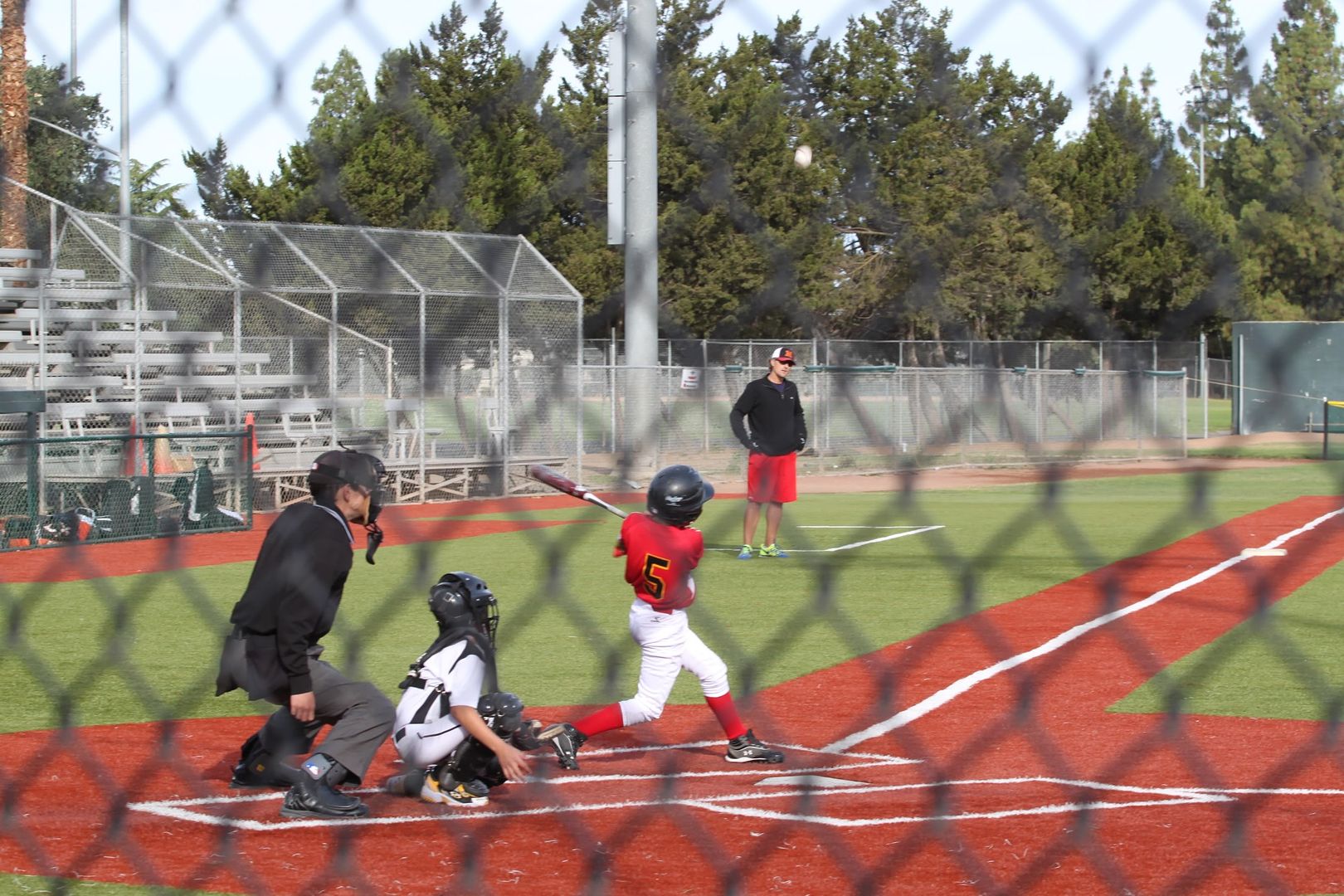 |
| The air is shattered by the force of Michael's blow... |
The team went on to have a great season.
They finished above .500 overall, with a
number of memorable performances along the way.
It took a while for Michael to find a consistent position on the
field.
He spent time in the outfield,
second base, third base and shortstop.
As the season progressed, he settled in mostly at second base and short,
although his relatively weak throwing arm meant that second base was generally
the best place for him.
Nevertheless, it
became clear as the season went along that as an overall plus defender, he had
become one of the few players to spend regular time at shortstop.
With the exception of a brief appearance on the mound in a
mid-season tournament, Michael did not pitch at all during the season until a Memorial
Day tournament held between the end of the regular season and the beginning of
the playoffs.
In the first game of the
tournament, we were demolishing a team from my old home area (Mountain View-Los
Altos), coincidentally also named the Mavericks.
In view of innings limits on all pitchers, and
to save his regular pitchers’ arms for more important games, the manager
decided to put Michael on the mound for the last inning.
The thought process was apparently even the
inexperienced kid couldn’t screw up so badly to cause us to lose the game, and
having him pitch an inning meant our real pitchers could save that inning for
their own allocation in later games.
To
the shock of everyone except maybe me, Michael faced the minimum three batters,
striking out two of them.
Michael had
been one of the primary pitchers for the teams I coached for the previous two
years, but since none of the other dads had paid too much attention to him then,
his performance came as a surprise.
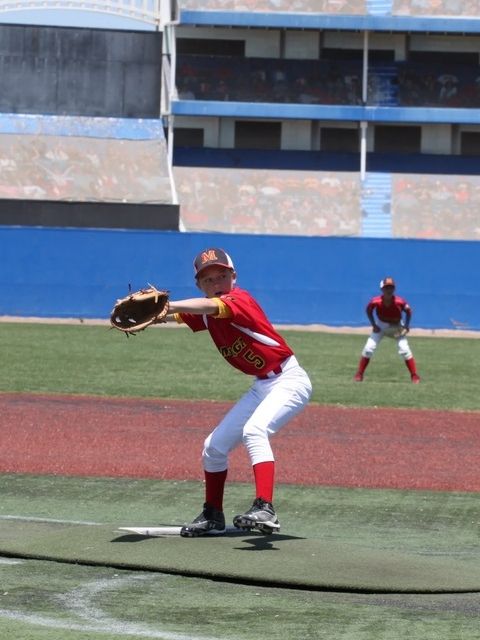 |
| On the mound for the first time all year |
As an apparent reward for his dominant inning of work, the manager
gave Michael the starting assignment for our next game, against our archrivals
who happened to be playing the same tournament.
Michael now had everyone’s full attention.
In scorching heat, he pitched four innings of
one-run ball in what ended up five-inning victory, striking out six and earning
the win.
The team dinner that followed
could not have been more sweet.
All the
players and their moms and dads showered him with praise all evening.
He was the quietest kid on the team, but over the course of
the season, culminating with the two pitching performances nobody saw coming,
he proved his versatility and skill.
He
wasn’t the best player on the team, but everyone realized he had become one of
the most indispensable players.
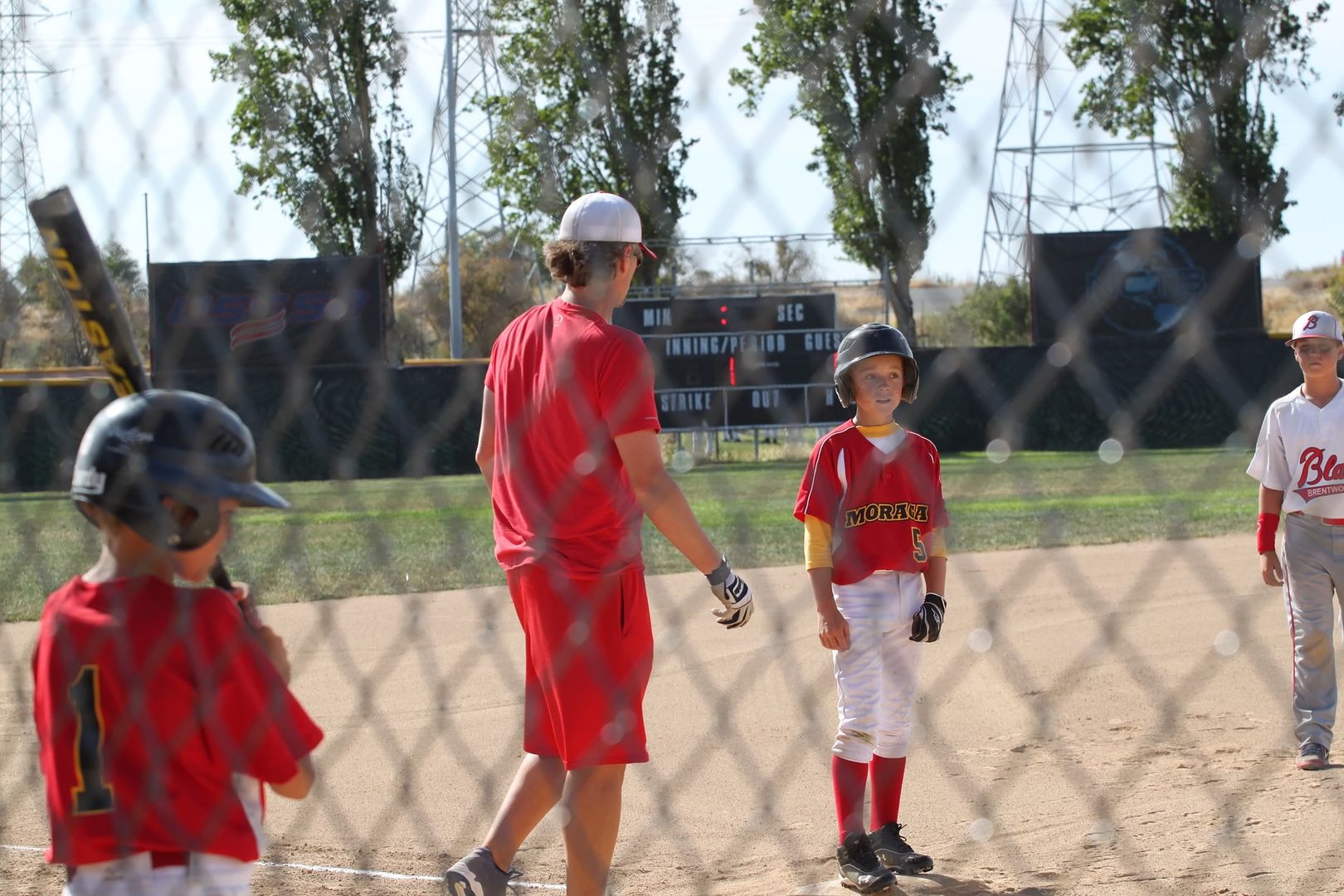 |
| At third, where he was a frequent visitor as the season went on |
The season ended with a memorable run through the playoff
tournament, which included a dramatic extra-inning win, a seven-inning complete
game under the lights from one of our top pictures, and a showdown yet again
with our archrivals.
By that point, we
were in our sixth game of the three-day playoff tournament and were starting to
get a bit thin in pitching.
We were now
also running up against the top teams in the league, all teams that had been
above us in the standings during the season.
We played our archrivals tough, but throughout
the game we had a sense that we were just barely escaping disaster inning after
inning.
The dam finally broke late in
the game as we started issuing walks, giving up hits and generally losing the
ability to get their batters out.
Inevitably, it seemed, with the season now literally on the line (with a
few more runs, our opponent could end the game under mercy rules, and thus also
end our season), the manager brought Michael in with the bases loaded and
nobody out – an impossible situation.
Having already pitched six innings in two games that weekend, facing a
team that was too good to be denied forever, Michael was unable to stanch the
bleeding.
Uncharacteristically wild, he
gave up some walks and some hits.
He did
manage to get some ground balls that, but for errors on defense, would have
gotten us out of the inning.
Unfortunately, the game, and the season, ended there.
After such a great season, filled with many exciting moments
and a high degree of success, it was jarring to have everything end so
suddenly. The game over, parents packed up
their foldable sports chairs and drifted away to the parking lot. I felt heartbroken for Michael, empty, and
mystified. It is hard not to feel that
your kid is absorbing the blame for the season coming to an end, particularly
when everyone scurries away almost without a word. No post-tournament lunch, no post-season
banquet, nothing. We are so often such
insecure creatures that the confidence born of six months of consistent improvement,
accomplishment and success can vaporize in the face of sudden adversity.
Baseball is the loneliest of team games. Gameplay proceeds sequentially from one
player to another, not in parallel where players work together in the same
moment. The player on the mound when the
season ends in a loss can be viewed by some, rightly or wrongly, as the loser
of the game, or in this case the season.
I’m sure the players and their families did not intend to make Michael
feel small, but I’m also sure they all probably would have rather seen somebody
else pitching at the end of the game.
This would change in the coming seasons, but in that moment, on the
drive home I died inside a little bit for Michael.
I had my own harbinger of things to come. I arrived at our first game of the season
part way through the first inning after helping out at the high school for the
spring musical in which Kelly was participating. One of the other dads ran up to me holding
the scorebook, asking if I could score the game. He may have recalled that I kept track of
every pitch in the previous two seasons while coaching. Like any other new guy joining an established
organization, I was eager to help in any way I could and gladly took on the
role of scoring the game, something I had never actually done before. As it turned out, once I picked up the
scorebook, I never let it go. With the exception of a few games here and there,
I scored every game. That gave me the
opportunity, for my own amusement, to compile statistics for all of the players. In the end, Michael was just about mid-pack
in all the batting categories, and a surprising number two in RBI and fourth in
runs scored. After a full season, the
numbers proved that he was no longer the 12th man on a twelve man
team.
I knew it would take Michael getting back on the
field with his teammates to push aside the bitter memories of the very end of
the season, to
finally earn the unconditional respect and trust of his
teammates and their families. In the seasons to come, he would make that happen, in spades.
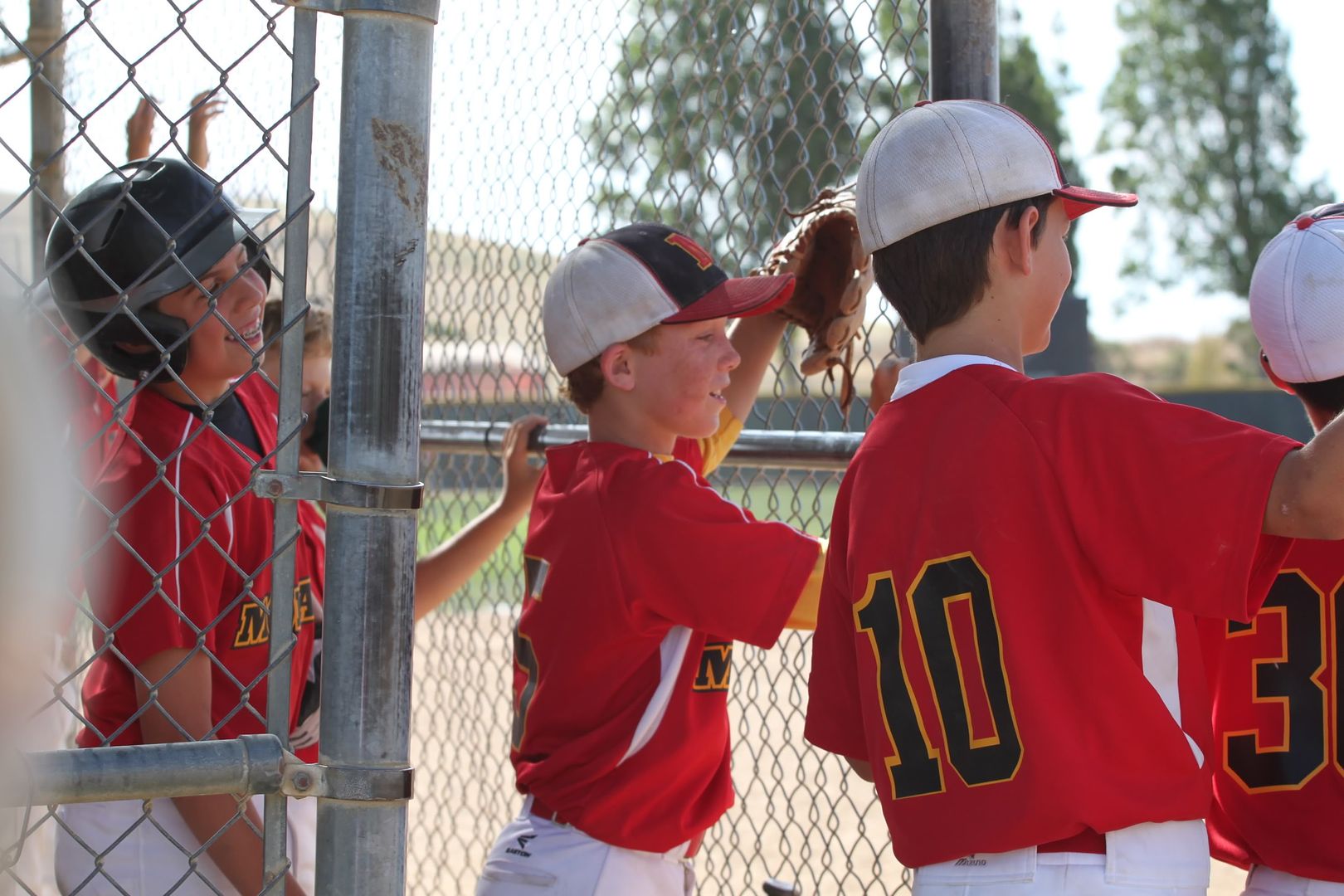 |
| Good times with friends in the playoffs. So much older in just a few months |
